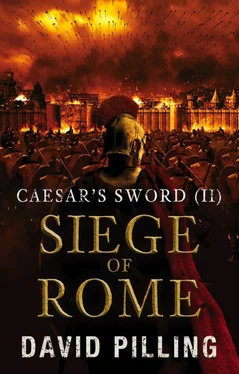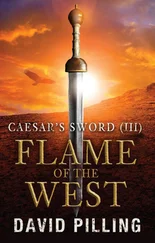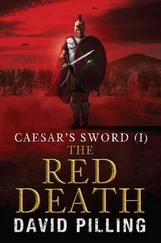David Pilling - Siege of Rome
Здесь есть возможность читать онлайн «David Pilling - Siege of Rome» весь текст электронной книги совершенно бесплатно (целиком полную версию без сокращений). В некоторых случаях можно слушать аудио, скачать через торрент в формате fb2 и присутствует краткое содержание. Год выпуска: 2013, Жанр: Исторические приключения, на английском языке. Описание произведения, (предисловие) а так же отзывы посетителей доступны на портале библиотеки ЛибКат.
- Название:Siege of Rome
- Автор:
- Жанр:
- Год:2013
- ISBN:нет данных
- Рейтинг книги:3 / 5. Голосов: 1
-
Избранное:Добавить в избранное
- Отзывы:
-
Ваша оценка:
- 60
- 1
- 2
- 3
- 4
- 5
Siege of Rome: краткое содержание, описание и аннотация
Предлагаем к чтению аннотацию, описание, краткое содержание или предисловие (зависит от того, что написал сам автор книги «Siege of Rome»). Если вы не нашли необходимую информацию о книге — напишите в комментариях, мы постараемся отыскать её.
Siege of Rome — читать онлайн бесплатно полную книгу (весь текст) целиком
Ниже представлен текст книги, разбитый по страницам. Система сохранения места последней прочитанной страницы, позволяет с удобством читать онлайн бесплатно книгу «Siege of Rome», без необходимости каждый раз заново искать на чём Вы остановились. Поставьте закладку, и сможете в любой момент перейти на страницу, на которой закончили чтение.
Интервал:
Закладка:
“Coel, isn’t it?” he asked after I had mumbled my thanks, “our sickly Briton. God help us, you look like you’ve puked out your innards. I thought the Britons were a seafaring race?”
“I am the exception,” I groaned, clutching my aching belly, “though doomed to spend my life being dragged back and forth across the sea.”
Bessas smiled and patted me roughly on the back. “You can go ashore at once, if you like, ” he said, “look there.”
He pointed at the hundreds of longboats and other smaller vessels that populated the stretch of ocean between our fleet and the coast. The city of Catania was visible to the east, dominated by the brooding shadow of Mount Etna. Procopius had informed me that the volcano last erupted during the days of the Roman Republic, and swamped the greater part of the city in an ocean of boiling lava and hot ash.
Our entire army was disembarking, with a calm order and efficiency that made for a stark contrast to the last time I had witnessed a Roman army disembark, on the north coast of Africa. There all had been chaos and haste, as our sickness-ravaged soldiers struggled to shore in terror of the Vandals falling upon them at any moment.
I spotted Belisarius on the foredeck, standing among a little knot of officers and advisors. Procopius was among them, listening and nodding gravely while the soldiers talked. He was wearing his enigmatic little smile, and I could guess his opinion of what was being said.
Thankfully, there was no sign of Antonina, though a golden-haired young man among the officers might have been Photius. “I was appointed one of the general’s personal guard,” I said, “my place is by his side.”
“Admirable,” smirked Bessas, “but you’re no use to him in your current state. Go ashore and recuperate. For now, the conquest of Sicily will have to proceed without you.”
He gave me back to my Hunnish guards, who had followed me above deck like a couple of faithful hounds, and barked at them to take me ashore. Somehow I found the strength to climb down a rope ladder into one of the launches. I took my place alongside a group of Isaurian archers, and listened in silent misery to their excited chatter as the boat rowed into the shallows.
I could see our army deploying on the broad plain south-west of the city, thousands of tiny doll-figures busily pitching tents and digging temporary fortifications. As usual, Belisarius was taking no chances. The majority of his troops would camp outside the city, along with the baggage, while troops of light horse were sent out to scout the countryside.
Anxious to be rid of boats and sailing, I dropped over the side as soon as it seemed safe, and staggered through warm, waist-deep waters towards the beach. The Huns dogged my steps, which was a comfort. Nobody watching could have any doubt that I was well-guarded, and still enjoyed the favour and protection of Belisarius.
From Catania the army marched north-west, leaving a garrison of two hundred men to hold the city. Belisarius had furnished me with a horse, and I rode at an easy peace in the rearguard, enjoying the peace and beauty of the island. Sicily basked in the autumn sun, and the lengthy, oppressive heat of summer had given way to a pleasant mildness. The hedges on the roadsides were loaded with prickly pears. When my stomach had eased, I promptly ruined it again by indulging in too much of the succulent fruit, and afforded the troops much amusement by throwing up in a ditch.
Our army hugged the coast, while the fleet kept in sight to the east, but there was no need for such precautions. As Procopius had predicted, Sicily was an easy conquest, and we encountered no resistance on the march to Palermo. The native farmers presented us with gifts of bread and fruit, and expressed warm enthusiasm at being rescued from the tyranny of the Goths.
Some tyranny, I remember thinking as I looked around at the prosperous little villages and fertile, well-tilled farmland. The Sicilians had no cause to hate their occupiers.
“They might soon have cause to hate us,” remarked Procopius when he rode down the line to speak with me, “if we are defeated in Italy, the Goths will exact a bloody revenge for their treachery. If we are victorious, and the island remains part of the Empire, the Emperor will squeeze them for everything they have. Sicily produces abundant crops of grain. Justinian will take it all in annual tribute, leaving the inhabitants to live on grass.”
Palermo was approached from the south via a road winding through craggy mountains. Belisarius sent horsemen ahead to scout the route. I saw Photius among them, his fair hair gleaming like burnished gold as he galloped at the head of a troop of Herulii. They returned unscathed – Procopius had had no opportunity to put his murderous little plan into effect – to report that the road was unguarded.
The city was an astonishingly beautiful sight, its whitewashed walls gleaming like pale diamond. I first saw it from a ridge overlooking the bay. Blue mountains enclosed and concealed Palermo from the landward side, and the sea from the east. I shaded my eyes and glimpsed the first of our ships rounding the headland to the south.
I also saw that the harbour was undefended. The garrison had closed the gates against us, but the city was open to assault from land and sea. There was no Gothic army lying in wait, hidden among the mountains. Either deliberately or through sheer negligence, Theodatus had left Sicily to its fate.
Keen to score a bloodless victory, Belisarius sent forward messengers to demand Palermo’s surrender. The garrison sent back a haughty reply, ordering the Romans to withdraw from their walls or face destruction.
That night Belisarius summoned his officers to a council of war. My presence was also required, along with five other members of his personal guard. I struggled into my heavy chain mail and crested helmet, and limped down to the general’s pavilion.
“I will not waste time in a siege,” said Belisarius, thumping his fist on the table set up in the middle of his tent. A map of Sicily rested on the table, with various lead markers representing our forces.
Bessas was present, along with Constantine and Valentinian, the general’s two other chief officers, and Galierus, the admiral of the fleet. Procopius was there in his capacity as secretary. He briefly glanced up at me as I came in, and then sidelong at Photius.
Seen at close quarters, Antonina’s son had something of the Greek god about him. Tall and blonde, well-made and impossibly handsome in a sculpted sort of way, he seemed to glow with a strange inner light, putting the rest of us in the shade. All his attention was on Belisarius, and he paid me no heed whatsoever.
“Then we must take the city by storm,” said Bessas, leaning over to study the map, “I suggest an attack at dawn from east and west. The Gothic garrison will be spread thin to repel us. Bloody work, but it can be done.”
There was a murmur of agreement from Constantine and Valentinian. Like him, they were a couple of hard-faced veterans. The three of them put me in mind of a pack of old mastiffs.
Steel flashed in the gloom of the tent. Photius had drawn his spatha, and slapped it down on the table. “General, I beg the honour of leading the vanguard!” he piped in the high-pitched, breaking voice of adolescence, “I will be the first man up the ladders!”
Procopius smirked, and the officers looked unimpressed, but Belisarius regarded him fondly. “I think not, brave Photius,” he said gently, “your mother would nail my skin to the walls of Palermo if any harm befell you.”
The boy’s flawless skin flushed with angry blood, and his lower lip trembled. He looked on the verge of hysterics, but Belisarius lifted a hand to calm him.
Читать дальшеИнтервал:
Закладка:
Похожие книги на «Siege of Rome»
Представляем Вашему вниманию похожие книги на «Siege of Rome» списком для выбора. Мы отобрали схожую по названию и смыслу литературу в надежде предоставить читателям больше вариантов отыскать новые, интересные, ещё непрочитанные произведения.
Обсуждение, отзывы о книге «Siege of Rome» и просто собственные мнения читателей. Оставьте ваши комментарии, напишите, что Вы думаете о произведении, его смысле или главных героях. Укажите что конкретно понравилось, а что нет, и почему Вы так считаете.












